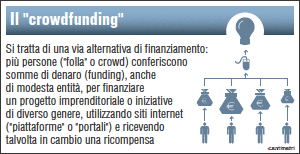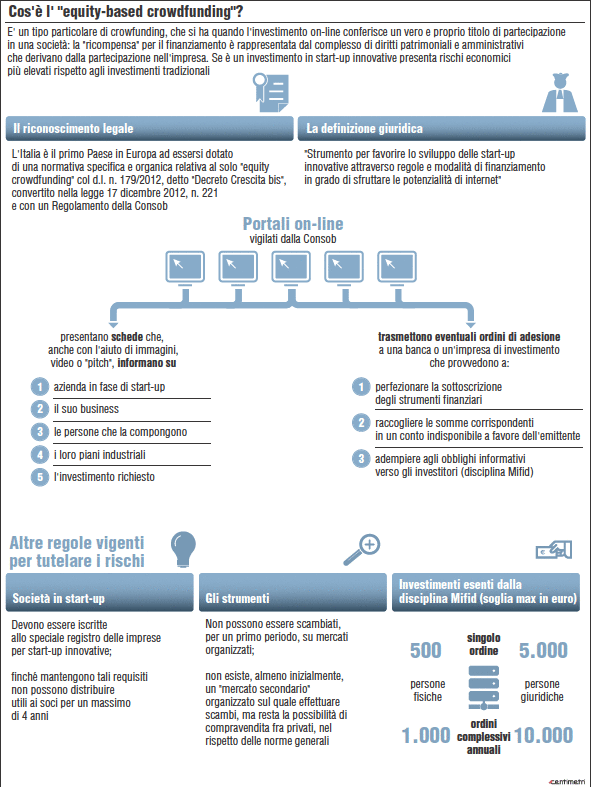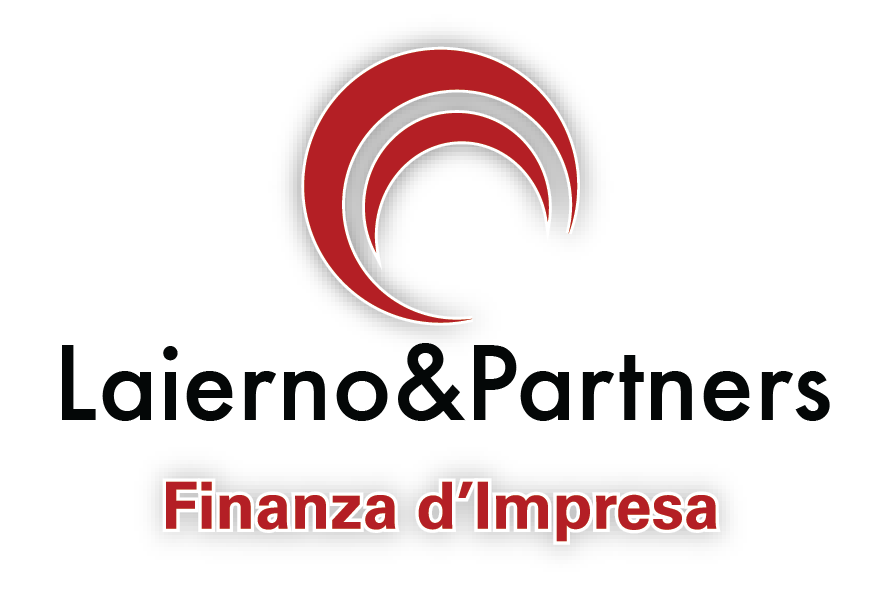CROWDFUNDING: What is Crowdfunding
Crowdfunding is an alternative funding solution. In practice, it is a process by which more people ("crowd" or crowd) give sums of money (funding), even small ones, to finance a business project or initiatives of different kinds using websites ("platforms" or "portals") and receiving a reward in return.
Equity-based crowdfunding is referred to as when online investment gives a real shareholding in a company: in this case, the "reward" for financing is represented by the complex of capital and administrative rights that participate in the company.
Regulation
Italy is the first country in Europe to have a specific and organic regulation relating to equity crowdfunding alone.
The rules introduced by the
Law No. 179/2012 (converted into law 17 December 2012, no. 221) bearing "Additional urgent measures for the growth of the country" (also known as the "Decreto growth bis") define crowdfunding as a tool to promote the development of innovative start-ups through rules and financing methods exploit the power of the internet.
Consob, through Regulation No. 18592/2013, then disciplined some specific aspects of the phenomenon with the aim of creating a reliable "environment" capable, that is, of creating confidence in investors.
The information needed to evaluate your investment in innovative start-ups is collected in online equity crowdfunding portals. These platforms are supervised by Consob that facilitate the raising of venture capital of innovative start-ups. The portals provide investors with information about start-ups and individual offers through special cards (written according to the standard model attached to the Regulation) which can also be presented with multimedia tools via images, video or "pitch" through which the company, its business, the people who compose it and the plans they intend to pursue with the investment sought are described.
Once the investor decides to invest in a start-up, the portal manager must submit the order of membership to a bank or investment firm who will refine the underwriting of the financial instruments (and to collect the corresponding sums in an account that is not available in favour of the issuer).
Under current regulations (MiFID rules), banks and SIMs will have to carry out the activity in accordance with information and investor behaviour obligations. However, there is an exemption from the application of the investment services rules as long as they do not exceed a threshold of 500 euros per single order and 1,000 euros for total annual orders (for investments of individuals) or 5,000 euros EUR 10,000 for total annual orders (investments of legal entities).

What are the main risks of investing in innovative start-ups?
Investing in innovative start-ups has particular characteristics and higher economic risks than traditional investments. As newly established companies operating in innovative sectors, the risk that the business project will fail is greater than that of companies that have been operating in a particular sector for some time, which, of course, also affects the risk of success. investors to lose all invested capital. The "Decreto growth bis" has also placed a ban on the distribution of profits for the entire period in which the issuing company has the requirements of innovative start-up, i.e. for a maximum of 4 years from registration in the special section of the register of companies. Finally, those who buy such instruments must also consider the risk of "illiquidity" linked to both the prohibition for an initial period of trading such instruments on organized markets and both to the fact that – at least initially – there is no such thing. organized "secondary market" on which to trade after subscription. The possibility of buying and selling between individuals remains firm, in accordance with the rules established for individual cases.


